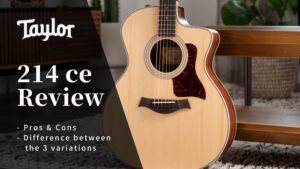The Acoustasonic Player Telecaster fuses acoustic and electric guitar features, offering unique sound variations. Its design ensures electric guitar-like playability while retaining acoustic sound qualities. Equipped with both Fishman piezo and magnetic pickups, it allows seamless blending of tones. The sound output can vary based on the amp used, with specific recommendations for optimal results. It's more affordable than the American Acoustasonic Telecaster but lacks some advanced features like the body sensor pickup.
I am Yosh, an ex-musical instrument store clerk (@Yosh_Guitar). In November 2021, the long-awaited Mexican-made Acoustasonic was released. I will review its features, sound list, and the differences from the USA-made American Acoustasonic Telecaster.
Pros of Acoustasonic Player Telecaster
- A unique structure that fuses acoustic and electric
- Strong electric guitar performance
- Equipped with two different types of pickups
A unique structure that fuses acoustic and electric
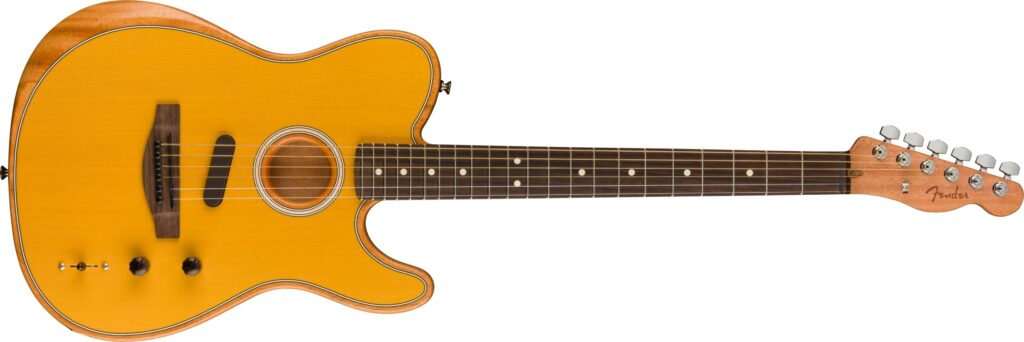
The Acoustasonic is a completely new guitar that fuses acoustic and electric guitars. Despite having the thickness of an electric body, it adopts a patented Stringed Instrument Resonance System (SIRS) with a uniquely designed sound hole. It produces a reasonably loud sound even when playing without amplifier. It seems perfect for casually playing at home. This guitar structure is equipped with pickups for both electric and acoustic, allowing sound creation for both.
Similar to the playability of the electric guitar

Thanks to the thin body and added elbow contour, it feels just like holding an electric guitar. The neck, although bolted on, has heel-less processing, allowing for playability in high frets that can’t be achieved with regular acoustic guitars. With 22 narrow tall-sized frets, a nut width of about 42.8mm, and a modern “deep C” neck shape that’s neither too thick nor too thin, it inherits from electric guitars. On the other hand, parts like the bridge saddle and custom light gauge (11-52) strings are similar to acoustic guitars. When played, it feels close to an electric guitar, but the sensation of pressing the strings feels closer to an acoustic guitar.
Equipped with two different types of pickups
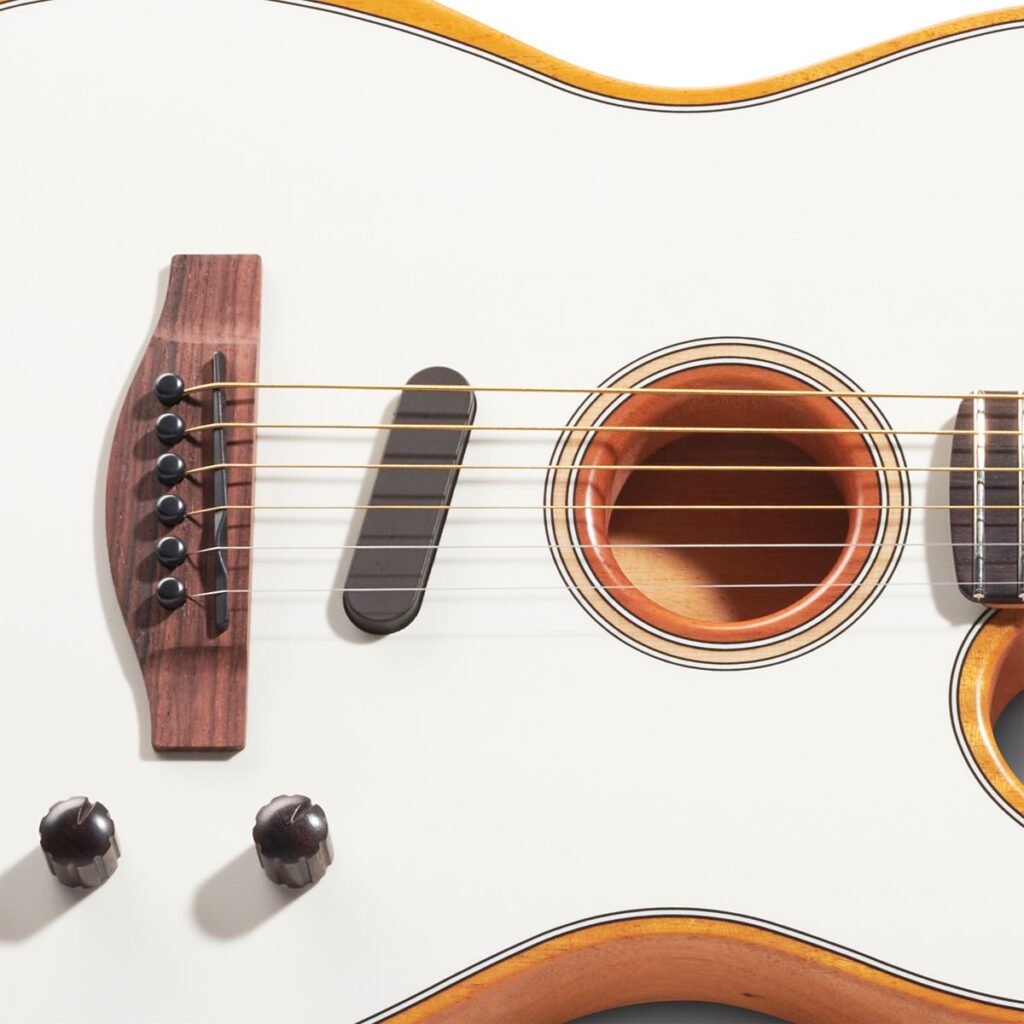
The pickups include a Fishman-made piezo pickup hidden under the saddle and a magnetic pickup similar to electric guitars, equipped with the Fender Acoustasonic Noiseless designed by the master Tim Shaw. You can switch between which pickup to output from with a three-stage pickup selector and seamlessly blend two types of tones with a knob. These tones are not just outputting the sound picked up by the pickup but also include modeled sounds.
Sound Voice List and Sound Video
The brand’s website does not list the built-in tones, so I will explain them by referring to the manual.
| A | B | |
|---|---|---|
| Position 1 | Noiseless Tele Pickup: Clean Telecaster tone. | Fat Noiseless Tele Pickup: Powered up with a slightly distorted Telecaster tone. |
| Position 2 | Lo-Fi Clean: Pure under-saddle piezo pickup. | Lo-Fi Crunch: Adds distortion to the piezo PU sound, sounding like both electric and acoustic guitars played simultaneously. |
| Position 3 | Mahogany Small Body Short Scale: Pre-war Gibson LG-2 style. A tight and warm acoustic sound from a short-scale mahogany body. | Rosewood Dreadnought: Martin D-28 style. A classic American acoustic sound ranging from brilliant highs to rich lows. |
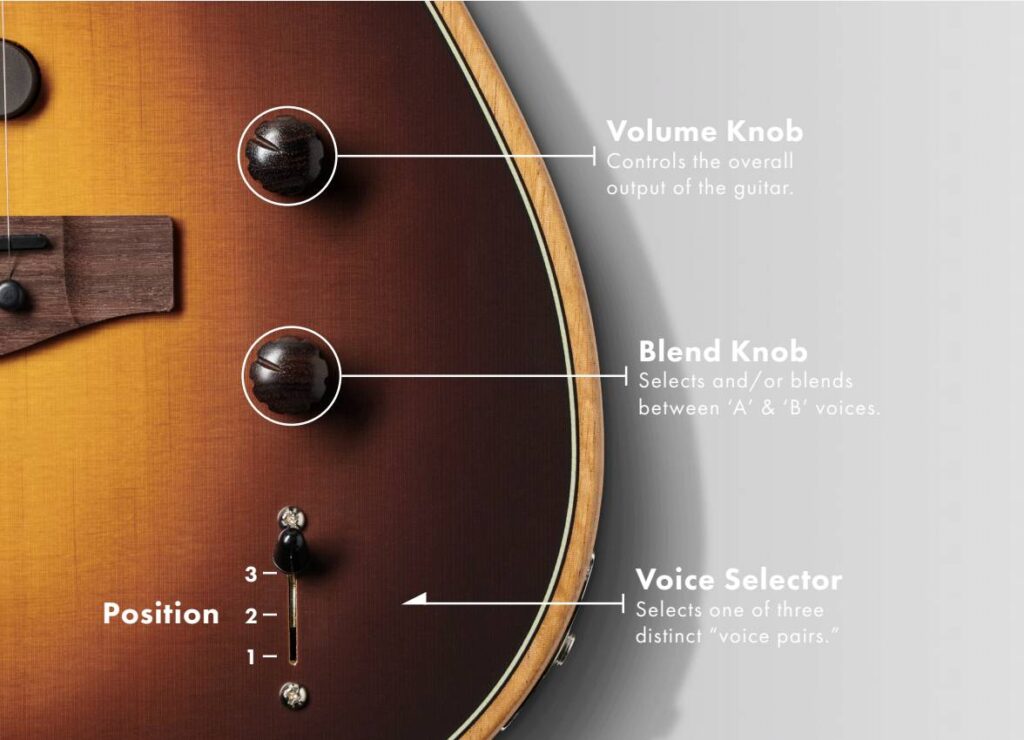
You can switch between the three positions using the pickup selector, and blend the A/B tones seamlessly with the knob. When turned to the maximum, you get a pure single tone. The guitar allows seamless blending between electric and acoustic sounds, enabling virtually infinite sound creation.
Position 1
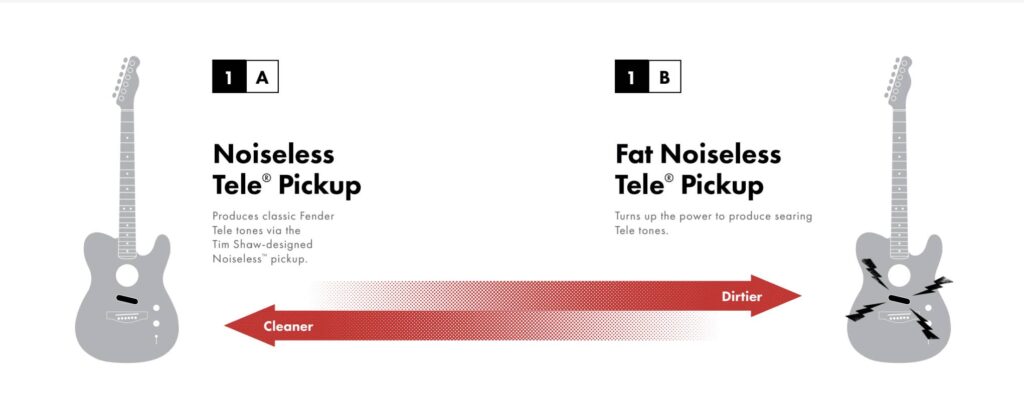
The noiseless pickup in position 1 is mostly an electric guitar sound. However, due to the guitar’s structure and the use of acoustic strings, it feels smoother than the typical Telecaster-originated Twangy tone. It’s nice to achieve distortion without using a drive pedal.
Position 2
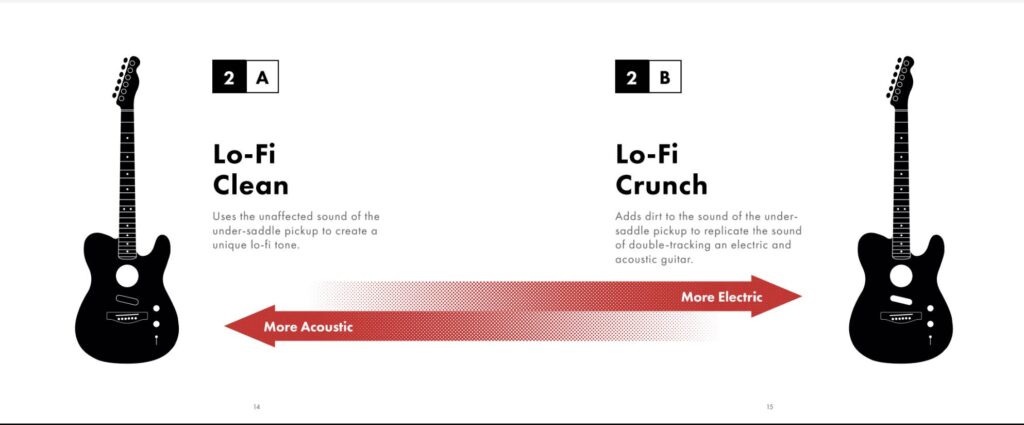
Position 2 is almost purely the sound of the piezo pickup. Most electro-acoustic guitars have this structure, so the sound is very similar. By blending in the crunch tone with the blend knob, you can achieve a sound that feels like both an electric and acoustic guitar played simultaneously.
Position 3
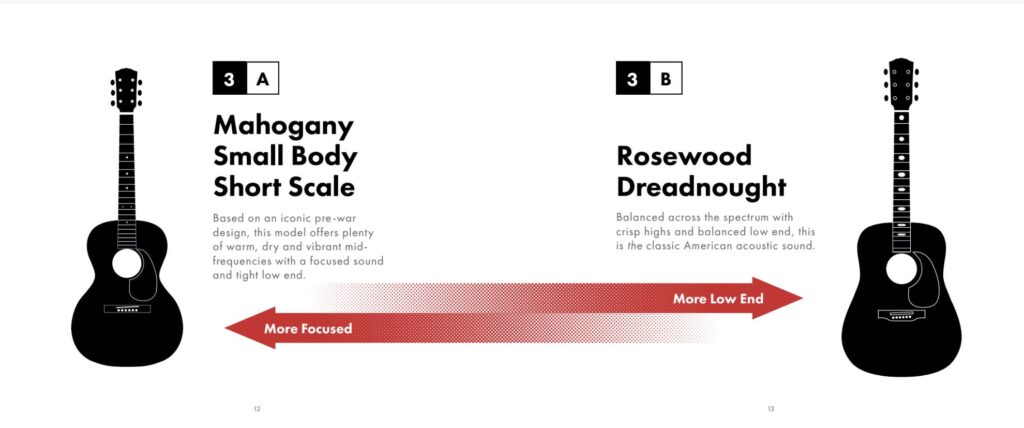
Position 3 adds modeling sounds that replicate the body resonance of an acoustic guitar to the sound from the piezo pickup, resulting in a very acoustic-like sound. Fender doesn’t specify the models, but from the description, they seem to be emulating the Gibson LG-2 and Martin D-28. The ability to produce the sounds of these two iconic guitars with just the Acoustasonic Player Telecaster is quite appealing. The LG-2 has a narrow range with warmth, while the D-28 has a wide range with brilliance. Being able to blend these two contrasting tones allows for a variety of natural acoustic sounds without using an EQ.
You can listen to all the tones at the beginning of this video.
Disadvantage: Sound changes significantly depending on the amp
While this guitar can produce both acoustic and electric sounds, the sound changes significantly depending on the amp used. If you’ve ever connected an acoustic-electric to an electric guitar amp, you’ll have an idea. For example, when outputting an acoustic sound connected to the studio’s standard amp Roland JC-120, it’s not bad, but it’s a bit different from a real acoustic sound. This is because electric guitar amps have a narrower reproduction bandwidth range compared to acoustic-electric amps or PA speakers, so they can’t fully express the airiness and richness unique to acoustics.
【Mexico vs USA】Comparison of differences with American Acoustasonic Telecaster
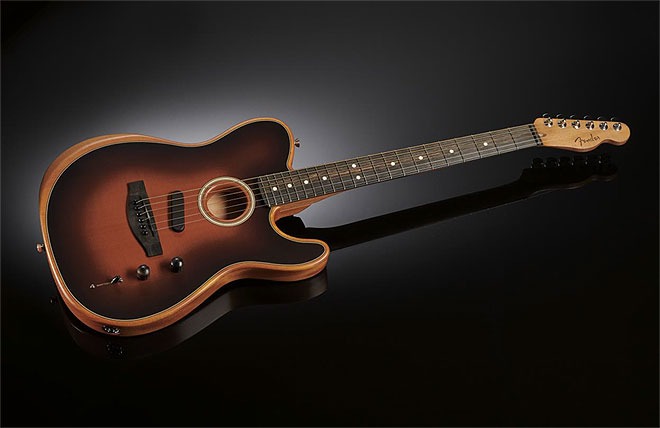
| Specification | Acoustasonic Player Telecaster | American Acoustasonic Telecaster |
|---|---|---|
| Market Price | $1,199.99 | $1,999.99 |
| Production | Ensenada Factory, Mexico | Corona Factory, USA |
| Body | Mahogany | Mahogany |
| Body Top | Solid Spruce | Solid Spruce |
| Neck | Mahogany | Mahogany |
| Neck Shape | Modern “Deep C” | Modern “Deep C” |
| Scale | 25.5″ (648mm) | 25.5″ (648mm) |
| Fretboard | Rosewood | Ebony |
| Fretboard Radius | 12″ (305mm) | 12″ (305mm) |
| Frets | 22 Narrow Tall | 22 Narrow Tall |
| Nut Width | 1.6875″ (42.86mm) | 1.6875″ (42.86mm) |
| Nut | Graph Tech TUSQ | Graph Tech TUSQ |
| Controls | Volume, Blend Knob, 3-Way | Volume, Blend Knob, 5-Way |
| Pickups | 2: Under-Saddle Piezo, Noiseless Pickup | 3: Under-Saddle Piezo, Noiseless Pickup, Body Sensor |
| Bridge | Graph Tech TUSQ | Graph Tech TUSQ |
| Power Source | 9V Battery/20 Hours | Built-in Rechargeable Battery/Up to 20 Hours |
| Strings | Phosphor Bronze 11-52 | Phosphor Bronze 11-52 |
| Case | Deluxe 1225 Gigbag | Deluxe 1225 Gigbag |
| Colors | 4: Brushed Black, Butterscotch Blonde, Shadow Burst, Arctic White | 5: Black, Crimson Red, Natural, Steel Blue, Sunburst |
The general specifications, size, and parts used are almost the same. Due to the difference in production countries, the Acoustasonic Player Telecaster is $800 cheaper, but some functions are reduced.
Difference 1: Pickups
It seems that the Fishman-made piezo and noiseless pickups are the same, but the Player does not have a body sensor compared to the American. The body sensor enhancer is a mic inside the body, adding airiness and resonance to the sound, making the American version produce a more realistic acoustic guitar sound. This pickup, which is not attached to the Player, picks up the sound of body hits. This is the most disappointing aspect of the Player ver, as it is only useful for slam technique recordings and looper performances.
Especially in acoustic guitar sounds, the American has a richer sound with more depth and three-dimensionality, so the Player seems a bit cheap. There is a comparison starting at 13:20 of this video. The one on the left of the screen is made in Mexico and the one on the right is made in USA.
Difference 2: Number of tones
With one less pickup, there is also less tone switching with the pickup selector. There are also fewer modeling tones for acoustic guitars. However, the Lo-Fi sounds from the American Acoustasonic Jazzmaster are built into the Acoustasonic Player Telecaster, so they are not necessarily backward compatible. American Acoustasonic’s built-in tones are below list.
| American | A | B |
|---|---|---|
| Position 1: Electric | Fender Electric Clean: Electric sound by Magnetic PU | Fender Electric Fat/Semi-Clean: Electric sound by Magnetic PU |
| Position 2: Acoustic & Electric Blend | Sitka Spruce/Mahogany Dreadnought: Martin D-18 style. Dense midrange and wide-range acoustic sound. | Semi-Clean: Blend of acoustic sound with electric sound. |
| Position 3: Percussion & Enhanced Harmonics | Sitka Spruce/Brazilian Rosewood Dreadnought: Vintage D-28 style. Rich and profound acoustic sound. | Blend with Internal Body Pickup: Blend of acoustic sound with body hits and harmonics. |
| Position 4: Alternative Acoustic | Engelmann Spruce/Maple Small Body: Parlor-sized acoustic. The clear sound that responds to touch. | Sitka Spruce/Mahogany Dreadnought: Martin D-18 style. Dense midrange and wide-range acoustic sound. |
| Position 5: Core Acoustic | Sitka Spruce/Rosewood Dreadnought: Martin D-28 style. Traditional acoustic sound. | Alpine Spruce/Rosewood Auditorium: Modern and pop acoustic sound. |
Difference 3: Fingerboard & Bridge Material


The Acoustasonic Player Telecaster uses rosewood for the fingerboard and bridge, while the American Acoustasonic Telecaster uses ebony. The fretboard material may have some effect on the sound, but the aforementioned difference in pickups is even more significant, so this point should not be considered as a comparison. Ebony has an exotic grain rather than the traditional pitch black, so the appearance is quite different.
Difference 4: Battery
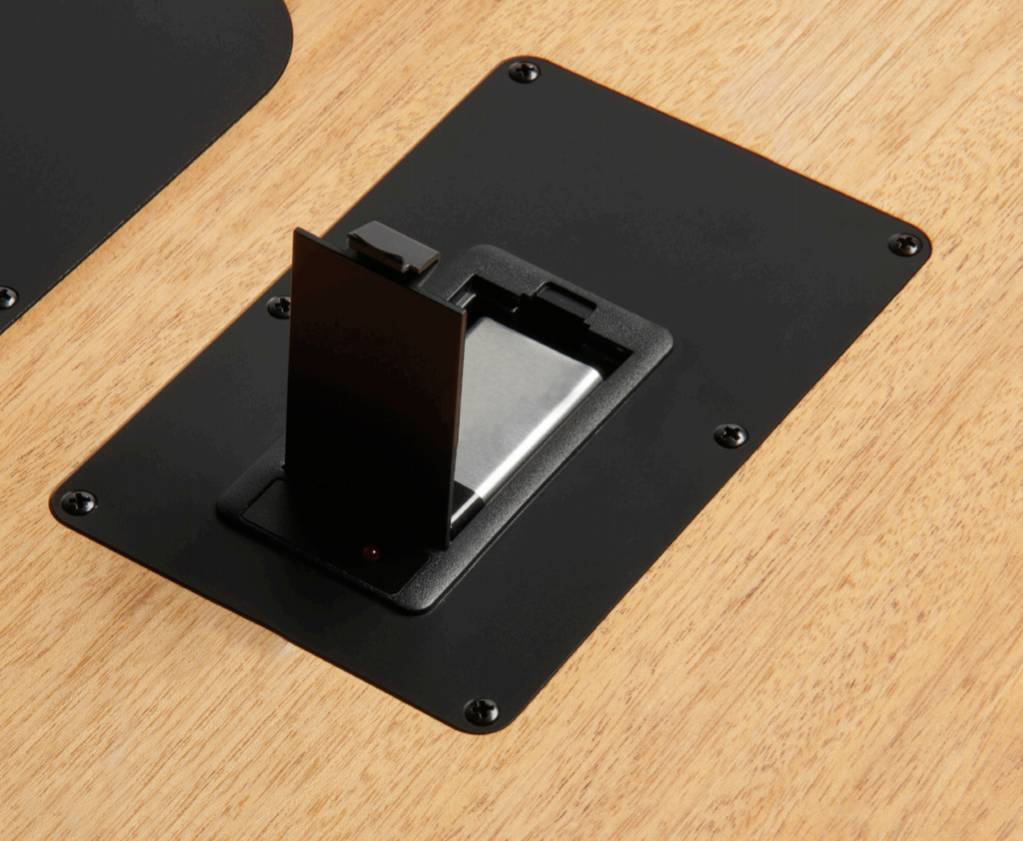
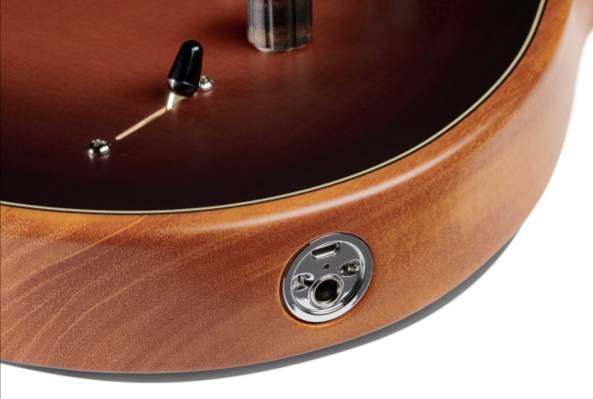
The Player is powered by a 9V battery, while the American has a built-in rechargeable battery. Player and American both runtime is about 20 hours.
Difference 5: Detail Finishing Quality
Although you cannot tell the difference from the spec sheet or photos, you can feel the difference when you look at the details and actually touch it. As one might expect, the quality of the parts directly related to playability, such as the adjustment of the nut, is higher on the USA-made models, probably due to the time and skill of the craftsmen who spent on the manufacturing process. However, the finish of the fret edges on Mexican-made guitars is also good enough, and they are not difficult to play, so there is no need to worry.
How to Choose: Mexico vs American
The Acoustasonic Player Telecaster is a fusion of acoustic and electric guitars by Fender, and the elimination of the production plant and body sensor has made the Acoustasonic Player Telecaster $800 cheaper and more accessible. This is a guitar that players who want to establish their next style with a new sound should look out for.
Acoustasonic Player Telecaster made in Mexico is recommended for those who:
- Want the new sound of an acoustic guitar and an electric guitar.
- Want the playability is similar to that of an electric guitar but with the sound of an acoustic guitar.
- Don’t need the sound of a body hit, so I want something that is $800 cheaper.
- Want to play at home with good volume and sound quality without an amp.
- Want a modeling sound that is richer than the line sound of an ordinary acoustic-electric guitar.
- Want a lo-fi Fi sound that is kind of cheap.
American Acoustasonic Telecaster made in USA is recommended for those who:
- Want to play slamming techniques with a line-out output
- Want to play with ease and stress-free.
- Want to add body hit sound to the looper pedal.
- Want more realistic acoustic guitar sounds with the body sensor.
- Want to have more variety of sounds than the ones made in Mexico.



